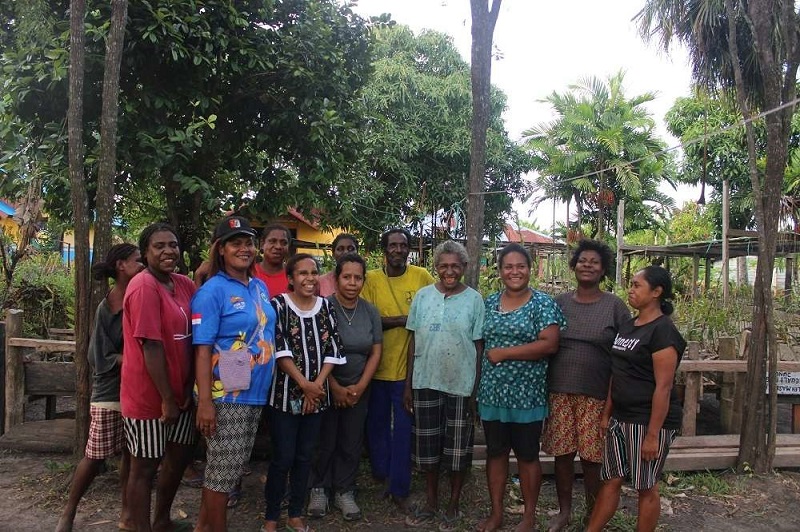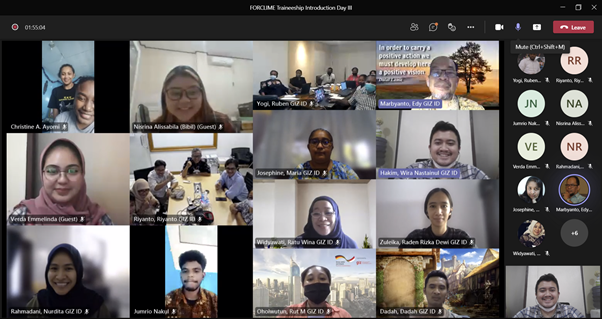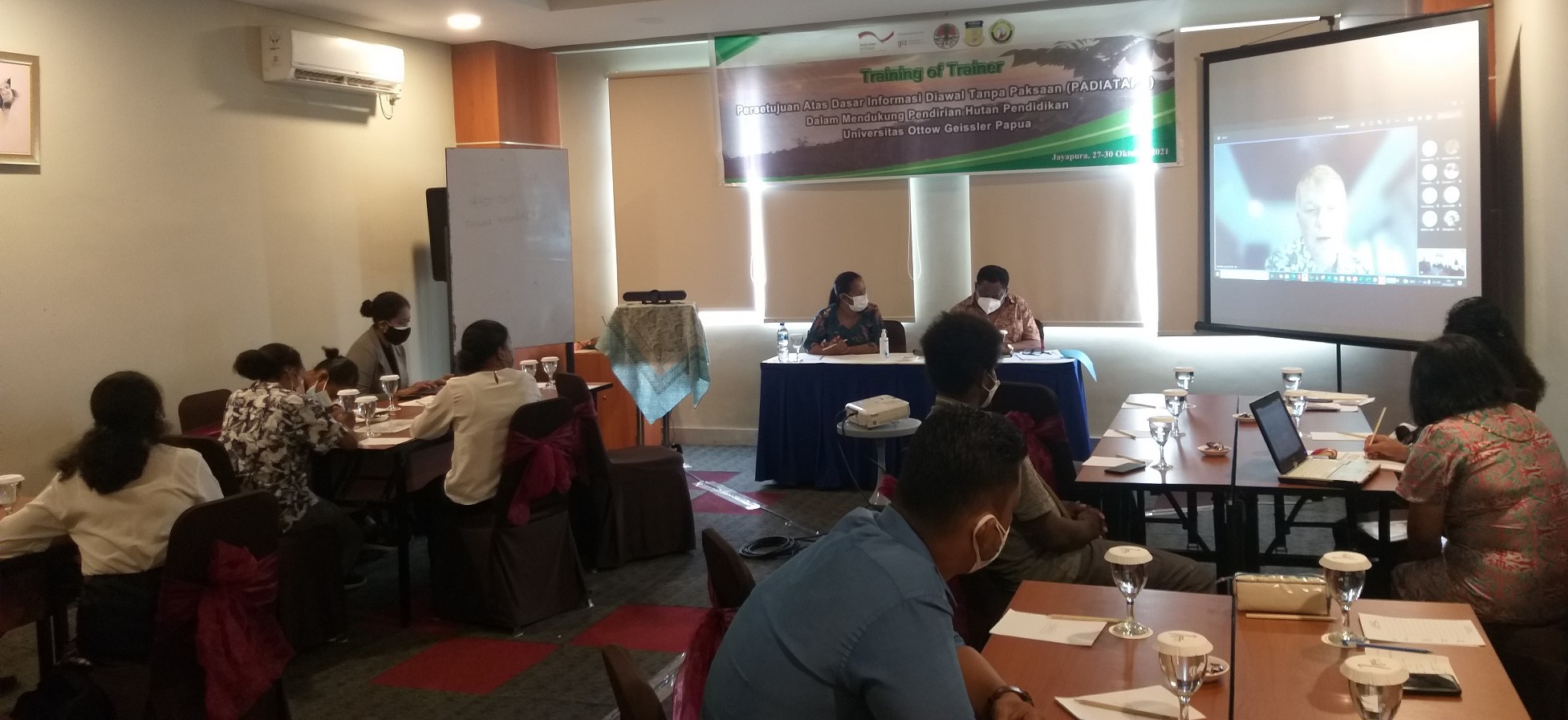FORCLIME
Forests and Climate Change ProgrammeTechnical Cooperation (TC Module)

Select your language

In an effort to support capacity building and the development of conservation partnerships in the Wasur National Park (TN Wasur) area, a number of target villages will be selected as locations in which the joint program will be implemented by FORCLIME and the Wasur National Park. For this reason, FORCLIME, working in conjunction with the Wasur National Park, completed a baseline survey from 8 - 12 November 2021 across five villages that had previously been identified based on the results of joint discussions. The villages visited were Wasur, Yanggandur, Rawa Biru, Tomer and Erambu-Toray. The five villages represent the Marind Anim Tribe from the Men-Gey Marori Tribe, the Kanume Sub-tribe and the Yeinan Tribe.
The data and information collected encompassed the geographical conditions, demographics and socio-economic-cultural conditions of communities, as well as various institutions, including customary institutions, and also land ownership status in relation to natural resource management and potential non-timber forest products. A division of tasks was implemented as regards the collection of this data and information. Specifically, the FORCLIME Papua Team conducted direct interviews with the community, while the Wasur National Park Team provided secondary data. An analysis of the collected data was then subsequently carried out by the two teams working together.
One of the interesting discoveries that emerged from the results of interviews with these communities is how local wisdom is essentially the basic capital that is used during the management of natural resources and manifests itself through traditions that are still being implemented to this day. One of these traditions is the Sasi system, which is known as “Sar” in the Kanume language. This system comprises a set of customary rules that regulate various prohibitions on the use of natural resources in locations or hamlets during certain periods. Sasi also relates to respect for relatives who have died and ceremonies are usually held after 40 days have elapsed since the death of a deceased relative. The ceremonies themselves involve the closing of access to certain areas in accordance with family agreements, usually for periods of between one and four years. In this regard, a Sasi location are often marked, for example, through the installation of coconut leaf stakes.
Information relating to such local wisdom is also set to be included in the report that will be published on the implementation of the survey. The implementation of the Sasi system remains very strong, especially in the village of Yanggandur, which was designated as a supported village by the Wasur National Park through the issuance of Decree of the Director-General of Natural Resources and Ecosystem Conservation No. SK 80/KSDAE/SET/KSA.1/2/2017.
The results of the baseline survey will ultimately be reported to the Head of the Wasur National Park. Said results will then be discussed by the relevant parties in order to determine the locations of the target villages in which the join programme of FORCLIME and the Wasur National Park will be implemented.
For more information, please contact:
Rut M Ohoiwutun, Junior Adviser for Community Forestry and Hutan Adat, Papua
Theodora Florida Resubun, Adviser for Sustainable Forest Management and Coordinator for Papua Province
Mohammad Sidiq, Strategic Area Manager for Sustainable Forest Management and Coordinator for Papua and West Papua Provinces

Following the success of its 2019 and 2020 programmes, FORCLIME has decided to organize another internship programme for 2021. This year, 10 students are set to join the programme: four from the University of Papua (Unipa) in Papua Barat and four from the University of Cenderawasih (Uncen) in Papua. The remaining two students come from IPB University in Bogor. The interns from Unipa will be based in Manokwari, the interns from Uncen will be stationed in Jayapura and the IPB University students will be stationed in Bogor.
In an order to offer participants a better understanding of the Forests and Climate Change Programme (FORCLIME), an introductory workshop was held from 1 - 3 November 2021 through a series of hybrid meetings. During the three-day workshop, information and knowledge about GIZ and the following topics related to FORCLIME activities were addressed:
- In terms of policy framework, the interns were offered various insights into forestry-related developments in the wake of the issuance of the Omnibus Law on Job Creation (UUCK).
- Topics relevant to sustainable forest management, including the development of forest management units (KPH) and social forestry activities based on lessons learned from FORCLIME’s previous phase in Kalimantan were addressed, as well as various activities that are currently ongoing in Tanah Papua.
- In terms of biodiversity conservation, interns were offered insights into various FORCLIME activities that are being implemented at the Lore Lindu Biosphere Reserve. In addition, attendees were also provided with information about Papua’s nature reserves (Cycloop, Tambraw Utara and Wasur National Park).
- Related issues: SDGs and gender mainstreaming.
Interns were also taught about knowledge management and administrative issues, as well as FORCLIME’s IT systems. In essence, the entire three-day introductory agenda offered the interns vital information which should be a useful starting point for their studies.
Following the three-day orientation, duty station Bogor trainees held a meeting with the e-Learning Development Division at the Center of Environment and Forestry Education and Training (CEFET). The meeting briefly discussed the e-learning system at the Ministry of Environment and Forestry, expected work and output from trainees, as well as communicating workflow and module selection. After the initial discussion, a weekly meeting schedule was agreed for every Tuesday in order to foster close coordination between the CEFET team and trainees.
For more information, please contact:
Verda Emmelinda Satyawan, Bogor trainee
Nisrina Alissabila, Bogor Trainee
Wira Nastainul Hakim, Junior Advisor for Human Capacity Development

Ottow Geissler University, supported by FORCLIME, held a training of trainers (ToT) session for the university’s students and academics from 27 - 30 October 2021 in Jayapura City, Papua Province. The ToT was held in order to support the Ottow Geissler University as it seeks to establish its Educational Forest (Hutan Pendidikan) within the Pasir 6 area of North Jayapura, which is in the territory of the traditional community of Necheibe Ormu.
This training session for the Civitas Academica, particularly the Team involved in the establishment of the Educational Forest, was held in order to teach a number of additional basic skills that are required to be understood and mastered in order to facilitate high-quality, open, fully informed and participatory agreement processes aimed at securing mutual agreements. Decent, comprehensive, informed consent should be communicated to the relevant communities and should address the benefits and impacts that they will experience when a given programme is implemented.
“I hope that this FPIC Training of Trainers will be able to produce good trainers and can be applied in the real world,” explained the Dean of the Faculty of Agriculture, Forestry and Marine Affairs at Ottow Geissler University, Mr. Simon H. Nenepath, M.Sc., during his opening remarks.
For more information, please contact:
Ruben Yogi, Junior Adviser for GIS and Forest Mapping
Mohammad Sidiq, Strategic Area Manager for Sustainable Forest Management and Coordinator for Papua and West Papua Provinces
 |
Supported By: |
  |